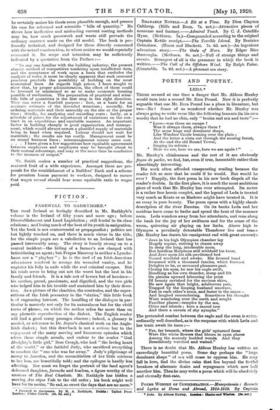POETS AND POETRY.
LEDA.*
THERE seemed at one time a danger that Mr. Aldous Huxley would turn into a second Mr. Ezra Pound. Now it is perfectly arguable that one Mr. Ezra Pound has a place in literature, but two—No ! Some of us wondered whether Mr. Huxley was always going to write verse like the following laments (in his own words) that he had no chin, only "brains and sex and taste" :—
"Love—was there no escape Was it always there, always there ?
The same huge and dominant shape, Like Windsor Castle leaning over the plain ; And the letter a vista cut through the musing forest, At the end the old Round Tower, Singing its refrain : • Here we are, here we are, here we are again "
Mr. Huxley's chinlessness and the rest of it are obviously facon di parler, we feel, but, even if true, lamentable rather than absorbingly interesting.
His work often afforded exasperating reading because the reader felt so sure that he could if he would. But would he ever ? Happily, the first poem in his new book dispels all the reader's doubts. In the first place, it is much the most ambitious piece of work that Mr. Huxley has ever attempted. Its metre is a rather free heroic couplet, and the legend of Leda is treated very much as Keats or as Marlowe might have treated it. It is an essay in pure beauty. The poem opens with a highly classic description of the river Eurotaa. On its banks Leda and her maidens have come to bathe and spend the heat-of the summer noon. Leda wanders away from her attendants, and runs along the bank for the joy of her swiftness and for the sense of the warm, quivering air playing on her limbs. Above high in Olympus a peculiarly detestable Thunderer lies and tosses (Mr. Huxley has drawn his omnipotent cad with great success) :
"Jove in his high Olympian chamber lay
Hugely supine, striving to charm away
In sleep the long, intolerable noon.
But heedless Morpheus still withheld his boon,
And Jove upon his silk-pavilioned bed Tossed wrathful and awake. His fevered head Swarmed with a thousand fancies, which forecast Delights to be, or savoured pleasures past.
Closing his eyes, he saw his eagle swift, Headlong as his own thunder, stoop and lift On pinions upward labouring the prize Of beauty ravished for the envious skies.
He saw again that bright, adulterous pair, Trapped by the limping husband unaware,
Fast m each other's arms, and faster in the snare—
And laughed remembering. Sometimes his thought Went wandering over the earth and sought Familiar places—temples by the sea, Cities and islands ; here a sacred tree And there a cavern of shy nymphs."
The pretended combat between the eagle and the swan is extra- ordinarily well described, as is the suspense with which Leda and her train await its issue :—
" Far, far beneath, where the girls' upturned faces Were like white flowers that bloom in open places Among the scarcely budded woods. And they Breathlessly watched and waited."
There is no doubt that Mr. Aldous Huxley has written an exceedingly beautiful poem. Some day perhaps the "huge dominant shape" of sex will cease to oppress him. He may fall in love, find the divine calm that lies beyond the fretful breakers of alternate desire and repugnance which now half smother him. Then he may write a poem which will be absolutely and eternally first-rate.










































 Previous page
Previous page